(完整word版)英语动词分类+动词时态之一般现在时(含练习)
- 格式:doc
- 大小:87.51 KB
- 文档页数:11
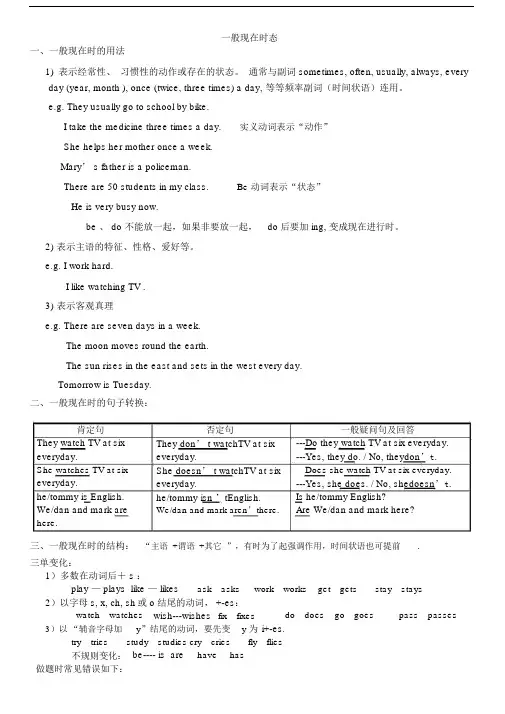
一般现在时态一、一般现在时的用法1)表示经常性、习惯性的动作或存在的状态。
通常与副词 sometimes, often, usually, always, everyday (year, month ), once (twice, three times) a day, 等等频率副词(时间状语)连用。
e.g. They usually go to school by bike.I take the medicine three times a day.实义动词表示“动作”She helps her mother once a week.Mary’ s father is a policeman.There are 50 students in my class.Be 动词表示“状态”He is very busy now.be 、 do 不能放一起,如果非要放一起,do 后要加 ing, 变成现在进行时。
2) 表示主语的特征、性格、爱好等。
e.g. I work hard.I like watching TV .3) 表示客观真理e.g. There are seven days in a week.The moon moves round the earth.The sun rises in the east and sets in the west every day.Tomorrow is Tuesday.二、一般现在时的句子转换:肯定句否定句一般疑问句及回答They watch TV at six everyday.She watches TV at six everyday.he/tommy is English. We/dan and mark are They don’ t watchTV at sixeveryday.She doesn’ t watchTV at sixeveryday.he/tommy isn ’tEnglish.We/dan and mark aren’there.---Do they watch TV at six everyday.---Yes, they do. / No, theydon’t.---Does she watch TV at six everyday.---Yes, she does. / No, shedoesn’t.Is he/tommy English?Are We/dan and mark here?here.三、一般现在时的结构:“主语+谓语+其它”,有时为了起强调作用,时间状语也可提前.三单变化:1)多数在动词后+ s :play — plays like — likes ask---asks2)以字母 s, x, ch, sh或 o 结尾的动词, +-es:work---works get---gets stay---stays watch---watches wish---wishes fix---fixes do---does go---goes pass---passes 3)以“辅音字母加- y”结尾的动词,要先变y 为i+-es.try---tries study---studies cry---cries fly---flies不规则变化:be---- is are have----has做题时常见错误如下:1)、be 动词与行为动词同时出现在句子中例: We are plant(plant) the trees in spring.答案: plant2)、单三人称形式易出错例: 1 He plaies (play) football very well.2 Danny gos (go) to school at 7:10.答案: 1 plays 2 goeses;解析: 1 以辅音字母加y 结尾的动词变单三人称形式才能把y 换成 i 再加2 与名词变复数不同,变单三人称形式以o 结尾的词要加 es.3)、在句式变换时易出错例: 1 Does Jenny has (has) a good friend?2 Brian doesn’ t lives (not live) in China.答案: 1 Does have 2 doesn ’t live解析:口诀:“见助动,用原形”。
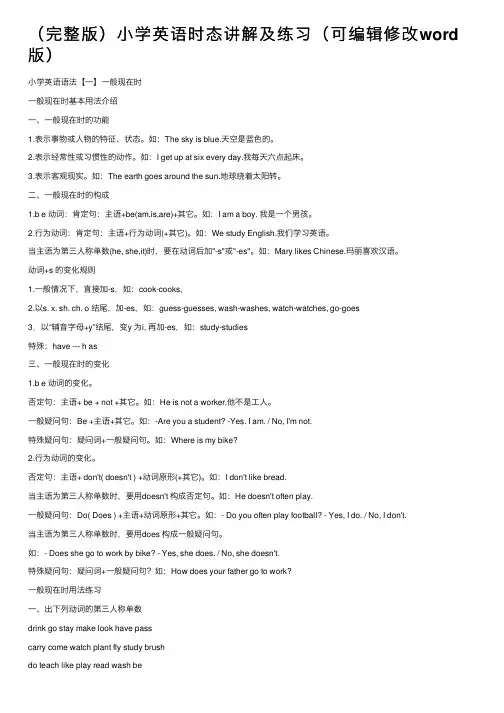
(完整版)⼩学英语时态讲解及练习(可编辑修改word 版)⼩学英语语法【⼀】⼀般现在时⼀般现在时基本⽤法介绍⼀、⼀般现在时的功能1.表⽰事物或⼈物的特征、状态。
如:The sky is blue.天空是蓝⾊的。
2.表⽰经常性或习惯性的动作。
如:I get up at six every day.我每天六点起床。
3.表⽰客观现实。
如:The earth goes around the sun.地球绕着太阳转。
⼆、⼀般现在时的构成1.b e 动词:肯定句:主语+be(am,is,are)+其它。
如:I am a boy. 我是⼀个男孩。
2.⾏为动词:肯定句:主语+⾏为动词(+其它)。
如:We study English.我们学习英语。
当主语为第三⼈称单数(he, she,it)时,要在动词后加"-s"或"-es"。
如:Mary likes Chinese.玛丽喜欢汉语。
动词+s 的变化规则1.⼀般情况下,直接加-s,如:cook-cooks,2.以s. x. sh. ch. o 结尾,加-es,如:guess-guesses, wash-washes, watch-watches, go-goes3.以“辅⾳字母+y”结尾,变y 为i, 再加-es,如:study-studies特殊:have --- h as三、⼀般现在时的变化1.b e 动词的变化。
否定句:主语+ be + not +其它。
如:He is not a worker.他不是⼯⼈。
⼀般疑问句:Be +主语+其它。
如:-Are you a student? -Yes. I am. / No, I'm not.特殊疑问句:疑问词+⼀般疑问句。
如:Where is my bike?2.⾏为动词的变化。
否定句:主语+ don't( doesn't ) +动词原形(+其它)。
如:I don't like bread.当主语为第三⼈称单数时,要⽤doesn't 构成否定句。
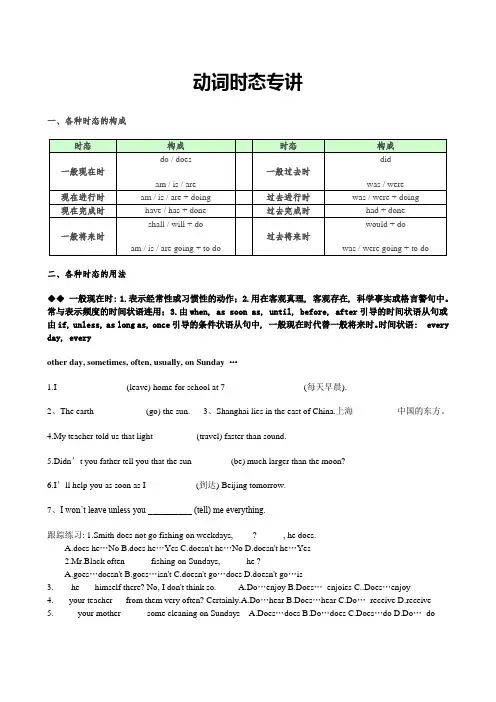
动词时态专讲一、各种时态的构成二、各种时态的用法◆◆一般现在时: 1.表示经常性或习惯性的动作;2.用在客观真理, 客观存在, 科学事实或格言警句中。
常与表示频度的时间状语连用;3.由when, as soon as, until, before, after引导的时间状语从句或由if, unless, as long as, once引导的条件状语从句中, 一般现在时代替一般将来时。
时间状语: every day, everyother day, sometimes, often, usually, on Sunday …1.I (leave) home for school at 7 _________________ (每天早晨).2、The earth ___________ (go) the sun.3、Shanghai lies in the east of China.上海__________中国的东方。
4.My teacher told us that light _________ (travel) faster than sound.5.Didn’t you father tell you that the sun ________ (be) much larger than the moon?6.I’ll help you as soon as I ___________(到达) Beijing tomorrow.7、I won’t leave unless you __________ (tell) me everything.跟踪练习: 1.Smith does not go fishing on weekdays, ____? _____ , he does.A.does he…NoB.does he…YesC.doesn't he…NoD.doesn't he…Yes2.Mr.Black often _____ fishing on Sundays, _____ he ?A.goes…doesn'tB.goes…isn'tC.doesn't go…doesD.doesn't go…is3.____he ___himself there? No, I don't think so. A.Do…enjoy B.Does…enjoies C..Does…enjoy4.___ your teacher __ from them very often? Certainly.A.Do…hear B.Does…hear C.Do…receive D.receive5._____ your mother _____ some cleaning on Sundays A.Does…does B.Do…does C.Does…do D.Do…do一般过去时: 1.表示在确定的过去时间里所发生的动作或存在的状态。
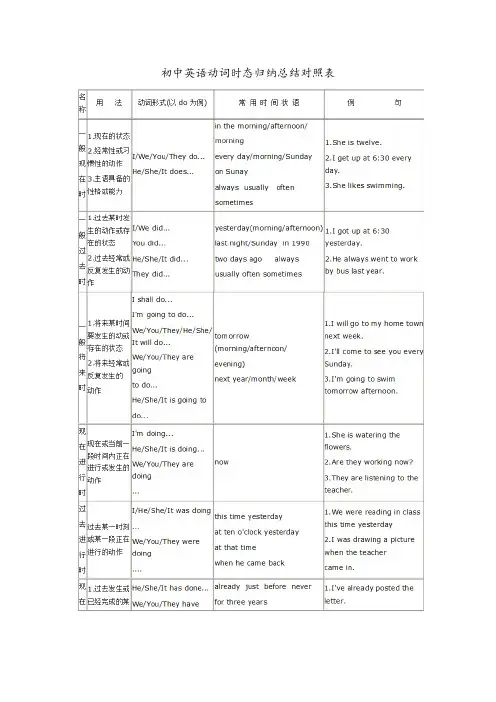
初中英语动词时态归纳总结对照表初中英语时态专项练习1、一般现在时。
通常用“usually, often, every day, sometimes”。
一般现在时基本用法介绍一、一般现在时的功能1.表示事物或人物的特征、状态。
如:The sky is blue.天空是蓝色的。
2.表示经常性或习惯性的动作。
如:I get up at six every day.我每天六点起床。
3.表示客观现实。
如:The earth goes around the sun.地球绕着太阳转。
二、一般现在时的构成: 肯定句:1).主语+系动词 be(is, am, are )+名词(形容词,介词短语)2) .其他主语+动词原形+其它第三人称单数+动词-s+其它如:I am a boy.我是一个男孩。
We study English.我们学习英语。
Mary likes Chinese.玛丽喜欢汉语。
三、一般现在时的变化否定句:1)主语+ be (is,am,are)+ not +其它。
如:He is not a worker.他不是工人。
2)其他主语+do not(don’t)动词原形+其它 I don't like bread 第三人称单数+does not(doesn’t)动词原形+其它He doesn't often play. 一般疑问句:1)Be(Is,Are) +主语+其它?如:-Are you a student? -Yes. I am. / No, I'm not. 2)Do其他主语+动词原形+其它? Does+第三人称单数+动词原形+其它+?注意:遇I/we—you, my—your, some—any. Does she go to work by bike? -Yes, she does. / No, she doesn't. Do you often play football?- Yes, I do. / No, I don't. 特殊疑问句:疑问词+一般疑问句。
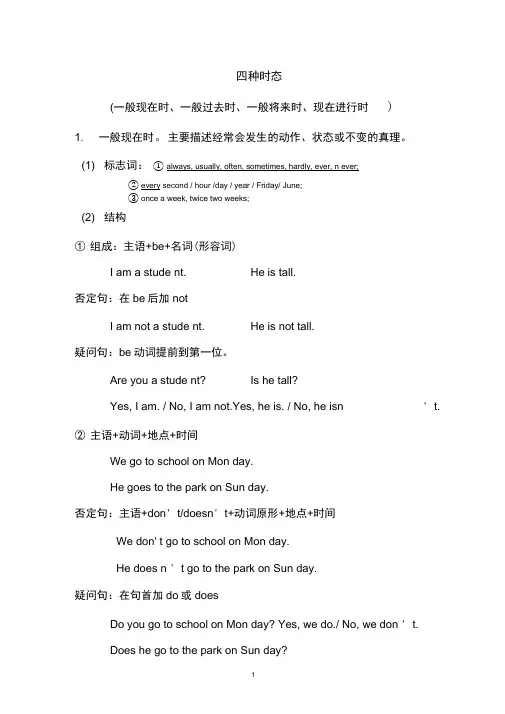
四种时态(一般现在时、一般过去时、一般将来时、现在进行时)1. 一般现在时。
主要描述经常会发生的动作、状态或不变的真理。
(1) 标志词:① always, usually, often, sometimes, hardly, ever, n ever;②every second / hour /day / year / Friday/ June;③once a week, twice two weeks;(2) 结构①组成:主语+be+名词(形容词)I am a stude nt. He is tall.否定句:在be后加notI am not a stude nt. He is not tall.疑问句:be动词提前到第一位。
Are you a stude nt? Is he tall?Yes, I am. / No, I am not.Yes, he is. / No, he isn ' t.②主语+动词+地点+时间We go to school on Mon day.He goes to the park on Sun day.否定句:主语+don' t/doesn' t+动词原形+地点+时间We don' t go to school on Mon day.He does n ' t go to the park on Sun day.疑问句:在句首加do或doesDo you go to school on Mon day? Yes, we do./ No, we don ' t.Does he go to the park on Sun day?Yes, he does./ No, he does n (3) 动词三单变化:① 在原单词末尾加s ,如:like - likes② 单词以 o, sh, ch, s, x 结尾力口 es,女口: go - goes ③ 单词末尾为辅音+y 结尾去y 加ies 女口: study- studies 2.现在进行时:主要叙述正在发生的事情。
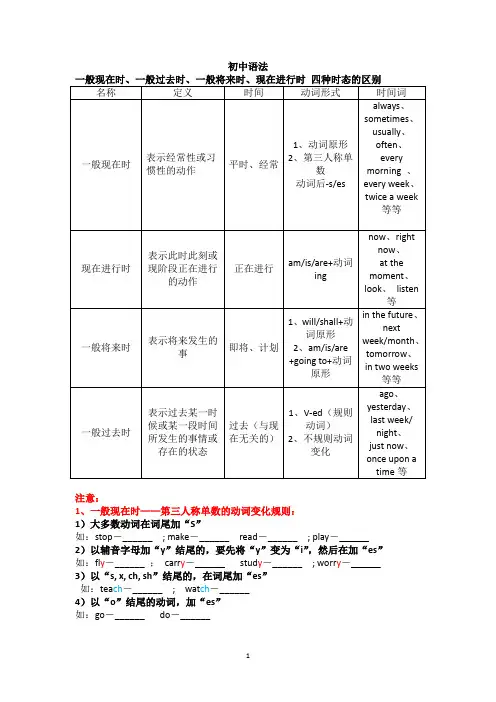
初中语法注意:1、一般现在时——第三人称单数的动词变化规则:1)大多数动词在词尾加“S”如:stop-______ ; make-______ read-______ ; play-______ 2)以辅音字母加“y”结尾的,要先将“y”变为“i”,然后在加“es”如:fl y-______ ;carr y-______ stud y-______ ; worr y-______ 3)以“s, x, ch, sh”结尾的,在词尾加“es”如:tea ch-______ ; wat ch-______4)以“o”结尾的动词,加“es”如:go-______ do-______2、现在进行时——动词ing形式的变化规则1.一般动词直接在词尾+ing例:read→______ (读)talk→______(交谈)sing→______(唱歌)2.以不发音e结尾的动词,先去e再加ing例:lik e→______喜欢writ e→______写skat e→______(滑冰)3.以重读闭音节结尾且末尾只有一个辅音字母的动词,双写末尾字母,再加ing 例:sto p→______(停止)ge t→______(得到)4.少数几个以ie结尾的动词,变ie为f再加ing。
例:l ie→______(躺、撒谎)t ie→______(系、捆绑)3、一般过去时——动词的变化规则(1) 一般在动词后加-ed。
如:play-______, offer-______, weigh-______, destroy-______, sign-______(2) 在以字母e结尾的动词后,只加-d。
如:lik e-______, provid e-______, hat e- ______ dat e-______(3) 在以“辅音字母+y”结尾的动词后,则改y为i,再加-ed。
如:suppl y-______, stud y- ______.(4) 在以单短元音的重读闭音节结尾且,末尾只有一个辅音字母的动词后,双写最后一个辅音字母,再加-ed。
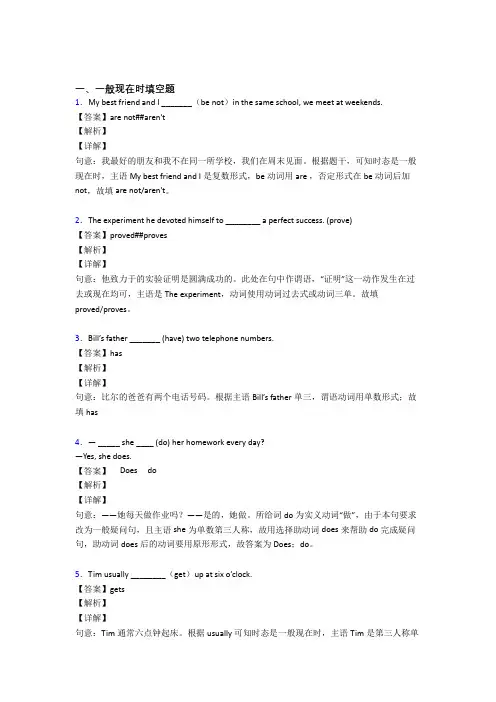
一、一般现在时填空题1.My best friend and I _______(be not)in the same school, we meet at weekends.【答案】are not##aren't【解析】【详解】句意:我最好的朋友和我不在同一所学校,我们在周末见面。
根据题干,可知时态是一般现在时,主语My best friend and I是复数形式,be动词用are ,否定形式在be动词后加not,故填are not/aren't。
2.The experiment he devoted himself to ________ a perfect success. (prove)【答案】proved##proves【解析】【详解】句意:他致力于的实验证明是圆满成功的。
此处在句中作谓语,“证明”这一动作发生在过去或现在均可,主语是The experiment,动词使用动词过去式或动词三单。
故填proved/proves。
3.Bill’s father _______ (have) two telephone numbers.【答案】has【解析】【详解】句意:比尔的爸爸有两个电话号码。
根据主语Bill’s father单三,谓语动词用单数形式;故填has4.— _____ she ____ (do) her homework every day?—Yes, she does.【答案】 Does do【解析】【详解】句意:——她每天做作业吗?——是的,她做。
所给词do为实义动词“做”,由于本句要求改为一般疑问句,且主语she为单数第三人称,故用选择助动词does来帮助do完成疑问句,助动词does后的动词要用原形形式,故答案为Does;do。
5.Tim usually ________(get)up at six o’clock.【答案】gets【解析】【详解】句意:Tim通常六点钟起床。
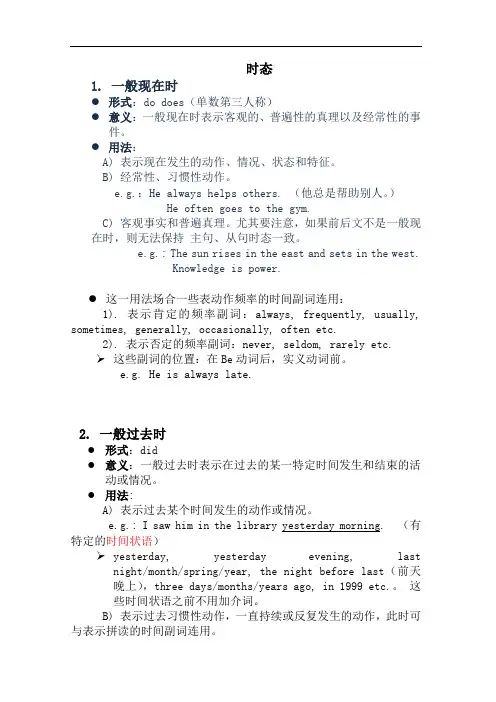
时态1. 一般现在时●形式:do does(单数第三人称)●意义:一般现在时表示客观的、普遍性的真理以及经常性的事件。
●用法:A) 表示现在发生的动作、情况、状态和特征。
B) 经常性、习惯性动作。
e.g.:He always helps others. (他总是帮助别人。
)He often goes to the gym.C) 客观事实和普遍真理。
尤其要注意,如果前后文不是一般现在时,则无法保持主句、从句时态一致。
e.g.: The sun rises in the east and sets in the west.Knowledge is power.●这一用法场合一些表动作频率的时间副词连用:1). 表示肯定的频率副词:always, frequently, usually, sometimes, generally, occasionally, often etc.2). 表示否定的频率副词:never, seldom, rarely etc.➢这些副词的位置:在Be动词后,实义动词前。
e.g. He is always late.2. 一般过去时●形式:did●意义:一般过去时表示在过去的某一特定时间发生和结束的活动或情况。
●用法:A) 表示过去某个时间发生的动作或情况。
e.g.: I saw him in the library yesterday morning. (有特定的时间状语)➢yesterday, yesterday evening, last night/month/spring/year, the night before last(前天晚上),three days/months/years ago, in 1999 etc.。
这些时间状语之前不用加介词。
B) 表示过去习惯性动作,一直持续或反复发生的动作,此时可与表示拼读的时间副词连用。
e.g.: I slept for eight hours last night. (表示在过去某一段时间内持续的动作,但这动作现在已经结束了)3. 一般将来时●形式:will/shall do或be going to do●意义:一般将来时表示在未来的某个时间将要发生的某个动作或状态。
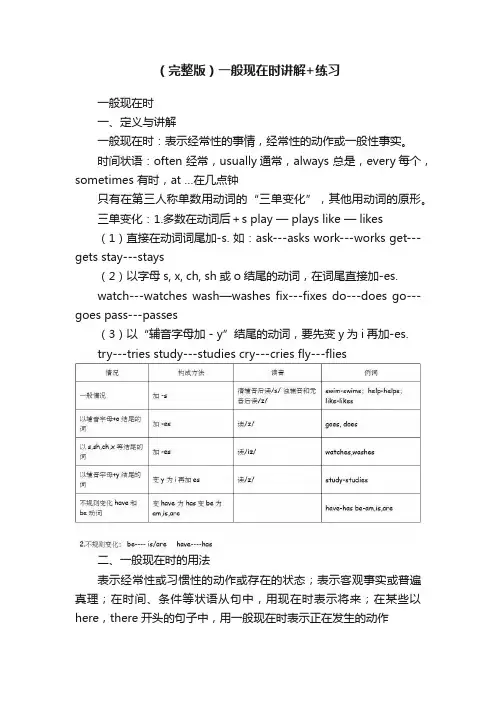
(完整版)一般现在时讲解+练习一般现在时一、定义与讲解一般现在时:表示经常性的事情,经常性的动作或一般性事实。
时间状语:often 经常,usually通常,always 总是,every每个,sometimes 有时,at …在几点钟只有在第三人称单数用动词的“三单变化”,其他用动词的原形。
三单变化:1.多数在动词后+s play — plays like — likes(1)直接在动词词尾加-s. 如:ask---asks work---works get---gets stay---stays(2)以字母s, x, ch, sh或o结尾的动词,在词尾直接加-es.watch---watches wash—washes fix---fixes do---does go---goes pass---passes(3)以“辅音字母加 - y”结尾的动词,要先变y为i再加-es.try---tries study---studies cry---cries fly---flies二、一般现在时的用法表示经常性或习惯性的动作或存在的状态;表示客观事实或普遍真理;在时间、条件等状语从句中,用现在时表示将来;在某些以here,there开头的句子中,用一般现在时表示正在发生的动作当主语是第三人称单数时:1、动词变相应的第三人称单数形式2、肯定句主语+动词s+其它3、否定句主语+doesn't+动词原形+其它4、一般疑问句Does+主语+动词原形+其它5、肯定回答 Yes,主语+does6、否定回答 No,主语+doesn't7、特殊疑问句特殊疑问词+一般疑问句当主语不是第三人称单数时:1、肯定句主语+动词原形+其它2、否定句主语+don't+动词原形+其它3、一般疑问句 Do+主语+动词原形+其它4、要注意,句式结构错则全都错。
5、谓语动词的形式:do/does一般现在时练习一、用所给词的正确形式填空1. We often ___________ (play) on the playground.2. He _________ (get) up at six o’clock.3. __________you _________ (brush) your teeth every morning.4. What____ (do) he usually _____ (do) after school?5. Danny _______ (study) English, Chinese, Math, Science and Art at school.6. Mike sometimes __________ (go) to the park with his sister.7. At eight at night, she ________ (watch) TV with his parents.8. ________ Mike________ (read) English every day?9. How many lessons ______your classmate____ (have) on Monday?10. What time ____his mother_________ (do) the housework?11. He often ______ (have) dinner at home. 12. Daniel and Tommy___ (be) in Class One. 13. We____ (not watch) TV on Monday. 14. Nick _____(not go) to the zoo on Sunday.15. They______ (like) the World Cup? 16. What ____they often ____ (do) on Saturdays17. Your parents________ (read) newspapers every day?18. The girl______ (teach) us English on Sundays.19. She and I _______ (take) a walk together every evening.20. There_______ (be) some water in the bottle. 21. Mike ______ (like) cooking.22. They_______ (have) the same hobby. 23. My aunt______ (look) after her baby carefully.24. You always____ (do) your homework well. 25. I_____ (be) ill. I’m sta ying in bed.26. She_____ (go) to school from Monday to Friday. 27. Liu Tao _____ (do) not like PE.28. The child often______ (watch) TV in the evening.29. Su Hai and Su Yang ______(have) eight lessons this term.30. -What day ______(be) it today? -It’s Saturday.31. Don’t make a noise. Grandpa __________ (sleep).32. Tom’s family__________ (watch) TV.33. It ________ (take) me two hours to finish my homework last night.34. What ______ your mother _______ (do) every evening? She_______ (wash) clothes.35. _______ it ______ (rain) every day?36. What _______ (do) you _______ on Sundays? We ________ (play) football.37. There ________ (be) a football match on TV every morning.38. They often ________ (visit) the Great Wall.39. Who _______ (dance) the best in your class?40. He _____________ (not come).41. The earth __________ (move) round the sun.42 She ________ (buy) a sweater.43. Mr. Wang often______ (go) to Shanghai.二、改句子1. Do you often play football after school? (肯定回答)_______________________________2. I have many books. (改为否定句)_______________________________3. Gao Shan's sister likes playing table tennis (改为否定句)________________________4. She lives in a small town near New York. (改为一般疑问句)________________________5. I watch TV every day. (改为一般疑问句)________________________6. David has a goal. (改为一般疑问句)________________________7. We have four lessons.(否定句)________________________8. Nancy doesn’t run fast (肯定句)________________________9. My dog runs fast. (一般疑问句) ________________________(把10—14小题变否定句,一般疑问句和划线提问)10. Mike has two letters for him. ________________________11. I usually play football on Friday afternoon.________________________12. Su Yang usually washes some clothes on Saturday. ________________________13. Mingming usually waters the flowers every day. ________________________14. Tom does his homework at home. ________________________三、写出下列动词的第三人称单数形式:1. wash_________ match _______ guess______ study______finish_________ go________ snow______ carry_________2. stop______ see________ drive ________let_______ carry______keep_____ join______ find_______ think________ teach______ catch______3. stay_______ begin______ forget_______ lie________ die _______run_______ prefer______ give________ ring_______ dance______ hope_______四、单项选择:1. There _____ an English film at the cinema now.A. will haveB. is going to haveC. is going to beD. is2. The picture _______ nice. A. looks B. is looked C. look D. is looking3. She ______ down and soon falls asleep. A. live B. lain C. laidD. sits4. They _____ the office in time very morning. A. reach to B. arrived C. went D. get to5. We shall go to Shanghai on business before you _____ back next week.A. will comeB. cameC. would comeD. come6. The plane ______ over there. A. is B. are C.am D. was7. I see her ____ the room this morning. A. to enter B. enteredC. enterD. enters8. The teacher ________us to come to school on time. A. ask B. asking C. asks D. asked9. John always ______ others. A. help B. helping C. helps D. to help10. He ______for eight hours every day. A. working B. to workC. worksD. worked11. You’d better ______ at home and ______ your homework.A. to stay, doB. stay, doC. to stay, to doD. stay, to do12. He sits down and ______ a rest. A. having B. have C. to haveD. has13. Uncle Wang never ______ a cake. A. make B. to make C. making D. makes五、请写出下列句子1.他每天早上七点乘公交车去上学。
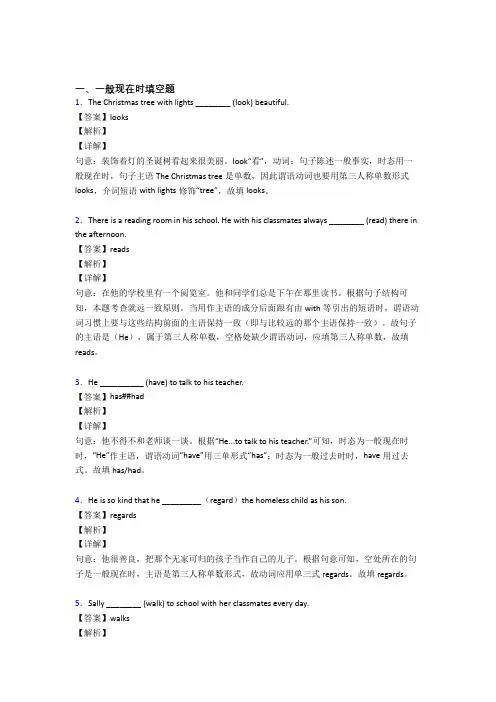
一、一般现在时填空题1.The Christmas tree with lights ________ (look) beautiful.【答案】looks【解析】【详解】句意:装饰着灯的圣诞树看起来很美丽。
look“看”,动词;句子陈述一般事实,时态用一般现在时,句子主语The Christmas tree是单数,因此谓语动词也要用第三人称单数形式looks,介词短语with lights修饰“tree”,故填looks。
2.There is a reading room in his school. He with his classmates always ________ (read) there in the afternoon.【答案】reads【解析】【详解】句意:在他的学校里有一个阅览室。
他和同学们总是下午在那里读书。
根据句子结构可知,本题考查就远一致原则。
当用作主语的成分后面跟有由with等引出的短语时,谓语动词习惯上要与这些结构前面的主语保持一致(即与比较远的那个主语保持一致)。
故句子的主语是(He),属于第三人称单数,空格处缺少谓语动词,应填第三人称单数,故填reads。
3.He __________ (have) to talk to his teacher.【答案】has##had【解析】【详解】句意:他不得不和老师谈一谈。
根据“He...to talk to his teacher.”可知,时态为一般现在时时,“He”作主语,谓语动词“have”用三单形式“has”;时态为一般过去时时,have用过去式。
故填has/had。
4.He is so kind that he _________(regard)the homeless child as his son.【答案】regards【解析】【详解】句意:他很善良,把那个无家可归的孩子当作自己的儿子。
根据句意可知,空处所在的句子是一般现在时,主语是第三人称单数形式,故动词应用单三式regards。
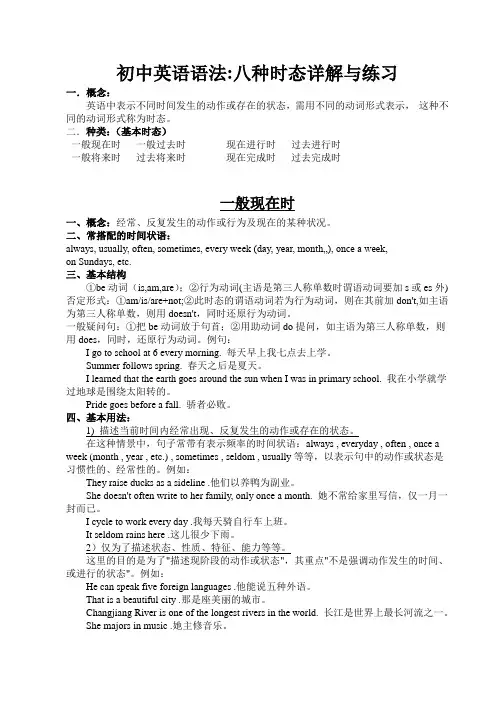
初中英语语法:八种时态详解与练习一.概念:英语中表示不同时间发生的动作或存在的状态,需用不同的动词形式表示,这种不同的动词形式称为时态。
二.种类:(基本时态)一般现在时一般过去时现在进行时过去进行时一般将来时过去将来时现在完成时过去完成时一般现在时一、概念:经常、反复发生的动作或行为及现在的某种状况。
二、常搭配的时间状语:always, usually, often, sometimes, every week (day, year, month…), once a week,on Sundays, etc.三、基本结构①be动词(is,am,are);②行为动词(主语是第三人称单数时谓语动词要加s或es外) 否定形式:①am/is/are+not;②此时态的谓语动词若为行为动词,则在其前加don't,如主语为第三人称单数,则用doesn't,同时还原行为动词。
一般疑问句:①把be动词放于句首;②用助动词do提问,如主语为第三人称单数,则用does,同时,还原行为动词。
例句:I go to school at 6 every morning. 每天早上我七点去上学。
Summer follows spring. 春天之后是夏天。
I learned that the earth goes around the sun when I was in primary school. 我在小学就学过地球是围绕太阳转的。
Pride goes before a fall. 骄者必败。
四、基本用法:1) 描述当前时间内经常出现、反复发生的动作或存在的状态。
在这种情景中,句子常带有表示频率的时间状语:always , everyday , often , once a week (month , year , etc.) , sometimes , seldom , usually等等,以表示句中的动作或状态是习惯性的、经常性的。
一般现在时态动词三单数的构成:1)一般情况再词尾加—s 。
例:make-makes play-plays get—gets read—reads2)如果动词原形词尾已有e,只加s。
close—closes ride—rides wake-wakes leave –leaves3)以s, x , ch , sh ,o 结尾的动词再词尾加-es. guess—guesses fix, teach, wash, go-goes, do —does4)以辅音字母加y结尾的动词要去y变i 加es. fly-flies , carry , study特殊:have-has用法一般现在时表示现在经常发生的动作或存在的状态。
构成:A. be 动词作谓语注: 我用Array am , 你用are , is用于他她它.单数主语用is ,复数主语均用are 。
缩写词:I am = I'm you are = you’re we are = we're they are = they’reare not =aren't he is = he’s she is = she’s it is = it’s is not = isn’t一般现在时表示现在的状态。
The boy is twelve years old /。
The workers are very busy 。
His mother is at work .单数形式,其余人称均用动词原形。
缩写词:do not = don’t does not = doesn’t1) 表示现在时间经常性反复发生或习惯性的动作,常与表示频度的时间状语连用。
时间状语:every…, in the morning (…) ,at…, on Sunday sometimes,, always , often ,usually , never, etc 。
I get I[ at 6:30 every day .She always helps others .He often goes to school on foot.I usually leave home for school at 7 every morning。
(完整word版)高三英语一般现在时、一般过去时、现在进行时、过去进行时、一般将来时.doc课题复习时态授课时间:教学目标重点、难点考点及考试要求备课时间:掌握一般现在时、一般过去时、现在进行时、过去进行时、一般将来时的基本构成和基本用法。
各时态在语法填空、改错题的综合运用1.高考考纲规定的 3500 左的词是基本词汇2. 词类:1)名词2)形容词3)副词4)动词5)代词6 )冠词7)数词8 )介词9)连词3. 时态和语态4. 虚拟语气5. 非谓语动词6. 简单句和并列句7. 名词性从句8. 定语从句9. 状语从句10. 主谓一致11. 特殊句式(省略,倒装,there be 句型,强调,插入语)教学内容一、知识点动词时态复习一般时态进行时态完成时态完成进行时态现在do/does am/is/are doing have/has done have/has been doing 过去did was/were doing had done had been doing 将来shall/will do shall/will be doing shall/will have done shall/will have been doing 过去将should/would should/would be should/would havedo doing should/would have been doing来done时态动词是谓语所表示的动作或情况发生时间的各种形式。
英语动词有16 种时态,但是常用的只有 11 种:一般现在时、一般过去时、一般将来时、现在进行时、过去进行时、现在完成时、过去完成时、过去将来时、现在完成进行、将来进行时、将来完成时时。
1、一般现在时一、定义 : 一般现在时表示现在经常反复发生的动作、存在的状态或习惯性的动作的时态。
状: always, usually, often, sometimes, every week (day, year, month?), once a week, on Sundays,二、基本构:主+be/ 原形(第三人称数)+其他三、注意的:1.第三人称数以及第三人称数的化在一般在中,当主是第三人称数,要用第三人称数形式,即常在原形后加-s 或-es。
一般过去时,一般将来时,一般现在时,现在进行时,现在完成时综合练习一.按要求填空。
1. He has been to the amusement park for three times.否定句:一般疑问句:肯定、否定回答:2O She is going to cook meaIs tonight.否定句:一般疑问句:3.Cao Yiqin went to the mountains last summer。
否定句:_一般疑问句:肯定、否定回答:划线部分提问:4.Cao Yiqin wiI I go to Shanghai next year.否定句:一般疑问句:肯定、否定回答:(word完整版)一般现在时—一般过去时—一般将来时—现在完成时综合练习5O I often pI ay footbaI I o否定句:一般疑问句:肯定、否定回答:6. Cao Yiqin often goes to bed at 10:30 at night o否定句:一般疑问句:肯定、否定回答:7O写出下列动词的现在分词、过去式和过去分词.buy cut dr i nk eat fa I Ifee I _____________________________________f i ght f i nd get give go hearI earn I ose meetpay readrun ______________ ________________ ________________say send s i t s I eep stand sw i mteach te I Ith i nk 二.选择题。
1. How Iong has Eliza been a nurse?Ao Sinee 2002. B. Four years ago。
C. In 2002.2.----- May I speak to Tom? -------------- S orry, he is not at home. Heto Shangha i. Ao has been B o has gone Co goes3.-How was your weekend on the farm? 一Great! We with the farmers oAo enjoy ourseIves B. went fishing C. wi I I work Do make fr i ends 4.——you ever to the Un i ted States?(word完整版)一般现在时—一般过去时—一般将来时—现在完成时综合练习一Yes, twice.A. Have: goneB. Have: beenC. Do: goD. Were: going5O They have been i n th i s city three years ago oAo for B. about Co s i nee60 - have you been I earn i ng Eng Ii sh?—I have been I earn i ng Eng Ii sh for s i x years oAo How Iong B. How often Co How far7.一Where i s Zhang Mi ng? ------ Oh, he to Bei jng and he wi I Ibe back tomorrow0A. has beenB. has goneC. goes8.The Greens supper now. A: is having B:are; havingC: is haveing9.you usuaI Iy to schooI with cI assmates ?A. Do, comesB. does, comeC. Do, come1Oo Mr Green usually newspapers after supper every day.A. readB. read i ngC. reads11.He I en(wash ) c I othes? Yes , she i s . Ao Is, washing B. Does , wash Co Is,washes12. There a dolphin show in the zoo tomorrow evening.A. wasB. is going to have Q wi I I have D o is go i ng to be 13. He her a beaut i fuI hat on her next b i rthday.A. givesB. gaveC. will giving D o is going to giving 14o There a meeting tomorrow afternoon.A. wi I I be going to B o wi I I going to be Co is going to be D. will go to be 三.填空题.1.我母亲通常在星期日打扫卫生、洗衣服。
一、(1)一般现在时的构成:一般现在时主要用动词原形表示,如果主语是第三人称单数则在动词原形后加“-s”或“-es”。
(2)一般现在时的用法:①表示经常性或习惯性的动作或存在的状态。
与一般现在时连用的时间状语:※表示频度的副词always,often,usually,sometimes等。
※on Sundays,on Monday afternoon,every day,in the morning,every year等时间状语。
※once a year, twice a month, three times a week之类的表示频率的词组。
如:He gets up at five o’clock every day. He often plays football.②★表示客观真理、事实、人的技能或现在的状态时句子里一般不用时间状语。
如:The earth turns round the sun.(地球绕着太阳转)Light travels faster than sound.(光传播比声音快)③★表示十分确定会发生(如安排好的事情)或按照时间表进行的(将要发生的)事情,用一般现在可以表达将来,句子中可以有将来时间。
如:The train for Haikou leaves at 8:00 in the morning.(开往汉口的列车上午8点开车)④★在时间状语从句中(以when, after, before, while, until, as soon as等引导)和条件状语从句中(以if,unless引导),用一般现在时代替一般将来时,句子可以有将来时间。
如:Please ring me up as soon as you arrive in Germany.(你一到德国就给我打电话) / If it rains tomorrow, we will have to stay at home.(如果明天下雨我们就只好呆在家)⑤★一般现在时用于倒装句中可以表示正在发生的动作,动词以come, go为主。
英语一般现在时全面讲解附练习及答案一、定义与讲解一般现在时:表示经常性,习惯性的动作或状态。
结构:动词原形(第三人称单数-动词+s/es)。
第三人称单数变化:(1)直接在动词词尾加-s.(2)以字母s, x, ch, sh或o结尾的动词,在词尾直接加-es.(3)以“辅音字母加- y”结尾的动词,要先变y为i再加-es.2.不规则变化:二、一般现在时用法1. 表示经常性,习惯性,永久性的动作或存在的状态.通常与副词sometimes, often, usually, always, every day (year, month ), once (twice, three times) a day,等时间状语连用。
2. 表示客观真理,科学原理,自然现象,等客观事实或格言,谚语等。
三、一般现在时的句子转换:(1)当句子中有be动词或情态动词时,则把be动词或情态动词(can,could等等)提到主语的前面变成疑问句;在be动词或情态动词后面加not变成否定句.(2)当句子中即没有be动词,也没有情态动词时,则在主语前加助动词do (you,以及复数), does(单数she,he,it)变成问句;在主语后谓语动词前加助动词don’t(I,you,以及复数), doesn’t(单数she,he,it)变成否定句,助动词后的动词要变成动词原形。
名师解析1.________ you often ________ tea?A.Do;drinks B.Does;drink C.Do;drink分析:你经常喝茶吗?根据often可知句子为一般现在时,主语为you,用助动词Do提问,动词用原形,C 符合题意,故选C。
2.My legs .A.hurt B.hurts C.hurting分析:我的腿……。
A痛,动词原形;B痛,动词单三形式,主语是名词复数,谓语动词用原形,排除;C痛,现在分词,用于现在进行时,构成be doing,缺少be,排除。
一般现在时结构及专项练习概念:1. 表示现在的状态I am twelve.2. 表示经常或习惯性动作He gets up at six.3.表示客观事实真理The earth goes around the sun.标志性词语:often,usually,sometimes,always,never,on Sunday,every year/month/day She often goes to school on foot.He goes to park once a week.行为动词第三人称单数加-s 的形式1. 一般动词直接加-s2. 以辅音字母+y,把y 改i 再加es,3. 以s,x,sh,ch 结尾的动词加-es4. 以o 结尾的动词一般加-es5. 特殊情况:have—has基本结构Be 型:肯定式:主语+ am/is/are +其他否定式:主语+ am/is/are+not+其他一般疑问句:Am/Is/Are+主语+其他?特殊疑问句:特殊疑问词is/are+主语?实义动词型:肯定式:主语+行为动词(注意人称三单形式)+其他否定式:主语+don’t/doesn’t+动词原形+其他一般疑问句:Do/Does+主语+动词原形+其他?特殊疑问句:特殊疑问词+do/does+主语+动词原形?1写出下列动词的第三人称形式wash:watch:study:finish:go:snow:carry:stop:see:drive:let:teach:keep:join:put:do:drink:enjoy play:begin:take:run:fly:talk:stay:look:think:carry:fix:单项选择1. There _____ an English film at the cinema now.A:is B:are C:am D:be2. The picture nic e. A:look B:looks C:looked D:be look3. He sits down and soon asleep.A:fall B:falling C:falled D: falls4. The water sweet.A:drinking B:drinks C:drink D:to drink5. I up at six but Mike up at sevenA:get,gets B:get ,get C:gets,get D:getting, to get6. My father for eight hours every day.A:working B:works C:work D:to work7. Uncle Wang never English, because he know how to say it.A:speak,doesn’t B:speak,don’t C:speaks,don’t D:speaks,doesn’t8. On Sunday my daughter watching TV and my son to play football with his friends.A:like,want B:likes,want C:like,wants D:likes,wants9. Su Yang usually some clothes on Sunday.2A:washed B:washs C:washes D:washing10. Su Hai and Su Yang eight lessons this term.A:have B:has C:haves D:having用所给词的正确形式填空1、We often (not play)on the playground.2、_____ you _____ (brush) your teeth every day?3、How many lessons _____ your classmate _____ (have) on Sunday?4、It (take) me two hours to finish my homework every day.5、The child often (watch) TV in the evening.6、What _____ he usually _____ (do) after school?7、 John _____ (study) Math , Chinese ,English ,Science and Art at school.8、_____ Mr. Wang often _____ (go) to Shanghai?9、 There _____ (be) a football match on TV every morning.10、We _____ (not watch)TV on Monday.句式训练1、Do you like to play football after school?肯定和否定回答:2、 I have many books.否定句:一般疑问句:肯定回答:否定回答:3、Nancy doesn’t run fast.肯定句:34、 I usually play football on Friday afternoon.否定句:一般疑问句:肯定和否定回答:特殊疑问句:5、 Tom does his homework at home.否定句:一般疑问句:特殊疑问句:6、 Mike has two letters for him.否定句:一般疑问句:否定回答:特殊疑问句:找出错误,并改正1. Is your brother speak English?2. Does he likes going fishing?3. Jane do his homework every morning.4. He like play basketball with his friends.5. We eats dinner at six and go to bed at eleven.6. My dog run fast.7. He speak English very well.8. What does they usually do on Saturday?9. My mother don’t have breakfast every morning.4。
动词分类+一般现在时(一)一、动词分类动词是英语词类中最重要的一种。
动词按其词义和在句中的作用可分为:及物动词实义动词不及物动词系动词动词情态动词助动词1.实义动词(有实际意义的动词,可在句中独立做谓语):及物动词可以直接加宾语(study/ learn/ eat/ drink/ wash…)不及物动词不能直接加宾语,但是不及物动词+介词+宾语(常见动词有:listen to/ look at/ speak to…)2.系动词+形容词1)感官动词:feel; sound; smell; taste; look +形容词(当look 做实义动词讲时为不及物动词)2)be/ seem+形容词3)表变化的词:get/ turn/ become/ go+形容词(get/ turn/ go当实义动词讲是意思分别为:得到/ 轮流/ 去、走)3.助动词无实际意义,在句中不能独立做谓语,have/ do 既可以做助动词也可以做实义动词(先做简单了解,之后讲动词时态时会经常见到)eg1. I have a bike. (have是实义动词)eg2. They have gone to Beijing. (have是助动词)eg3. I do my homework everyday. (do 是实义动词)eg4. I do like English. (do 是助动词)4.情态动词(情态动词在句中不可独立做谓语)常见情态动词:may, might, can, could, must, shall, should, will, would, had better, need(此处不做重点,之后会做情态动词专题)二.一般现在时的用法1. 基本用法表示经常的或习惯性的动作,常与表示频度的副词:always、usually、often、sometimes、seldom、never等以及时间状语:every day、every morning、every afternoon、every evening等连用。
Eg: He often goes swimming in summer.I usually go to school at 7 every morning.2. 拓展用法①表示现在的状态。
Eg: My father is at work. He is very busy.The boy is twelve.②表示主语具备的性格、特征和能力等。
Eg: My sister is very clever.I like singing, but I can’t sing very well.③表示客观真理,客观存在,自然现象。
Eg: The earth moves around the sun.Shanghai lies in the east of China.④表示按计划或安排好的,或将要发生的动作,可用一般现在时表将来。
但只限于start,begin,leave,go,come,arrive,return等。
Eg: The train leaves at six tomorrow morning.⑤在时间、条件状语从句中,用一般现在时表示将来时的动作。
Eg: If id doesn't rain tomorrow, we'll go to the park.三.一般现在时的结构㈠含Be动词的一般现在时的结构肯定句:主语+ am/is/are + 其他成分.(注意be动词的选取)否定句:主语+ am/is/are + not + 其他成分.一般疑问句:Am/Is/Are + 主语+ 其他成分?(注意疑问句的回答)Eg: I am a student./ She is a teacher. / We are doctors.I am not a student. / She is not a teacher. / We are not doctors.Are you a student? / Is she a teacher? / Are you doctors?(注意主语是第一人称代词在疑问句中的变化)㈡含实义动词的一般现在时的结构1. 动词第三人称单数形式的变化规则特殊:have的单数形式是has2. 基本结构①当主语是I,you,we,they等代词及表示复数概念的名词做主语时:肯定句:主语+ 动词原形+ 其他成分.否定句:主语+ don't + 动词原形+ 其他成分.一般疑问句:Do + 主语+ 动词原形+ 其他成分?(注意疑问句的回答)Eg: They study very hard.They don't study very hard.Do they study very hard?②当主语是she,he,it等代词及表示单数概念的名词作主语时:肯定句:主语+ 动词的第三人称单数+ 其他成分.否定句:主语+ doesn't + 动词原形+ 其他成分.一般疑问句:Does + 主语+ 动词原形+ 其他成分?(注意疑问句的回答)Eg: She gets up at 6 o'clock every morning.She doesn't get up at 6 o'clock every morning.Does she get up at 6 o'clock every morning?课堂练习:一、写出下列动词的第三人称单数。
1. eat grow see open wear2. push wash pass fix watch catch go do3. try fly carry worry cryStudy hurry4. say stay play5. have be二、用所给动词的一般现在时填空。
1. Peter (go) to school every day. He (study) very hard.2. The moon always (move) around the earth.3. you often (water) these flowers?4. They (be) doctors. They (not have) a holiday on Sundays.5. Mary (do) her homework after school. She (not watch) TV.6. She sometimes (sing and dance) happily.三、用be动词或do的适当形式填空。
1. --- your teachers work hard?---Yes, they .2. ---What they every day?---They their homework.3. --- the boy clever?---Yes, he . He his homework by himself.4. --- I tall and handsome?---Yes, you .5. ---How often she comb her hair?---She combs her hair twice a day.四、单选选择。
1. ---_______ he _______ to the park at 6:30 in the morning?---No, he ________.A. Does; goes; doesB. Does; go; doesn’tC. Does; go; does2. She usually _______ her friends. They often _______ tea.A. see; drinkB. sees; drinksC. sees; drink3. ---_______ your pen--pal _______ diving?---No, he _______. He ________ writing stories.A. Does; like; doesn’t; likeB. Does; likes; doesn’t; likeC. Do; like; don’t; likes4. ---________ you ________ coffee? ---Yes, I ________.A. Do; like; doB. Did; like; didC. Are; like; am5. She _______ tea, but he _______.A. likes; doesn’tB. like; don’tC. like; doesn’t课后练习:I. 写出下列动词的第三人称单数形式。
1. play________2. fly ________3. plant ________4. drink_________5. play________6. go_________7. make _________8. do__________9. dance________ 10. worry_________ 11. ask_________ 12. taste_________ 13. eat_________ 14. draw_________ 15. put_________ 16. throw_________ 17. say_________ 18. pass_________ 19. come_________ 20. sit _________II. 按要求改写句子。
1. It is sunny today.否定句:_____________________________________________一般疑问句:_________________________________________肯定、否定回答:_____________________________________2. All the students like singing.否定句:_____________________________________________一般疑问句:__________________________________________肯定、否定回答:______________________________________3. We can sing and dance.否定句:____________________________________________一般疑问句:________________________________________肯定、否定回答:____________________________________4 . John comes from Canada.否定句:______________________________________________一般疑问句:__________________________________________肯定、否定回答:______________________________________III单选选择。